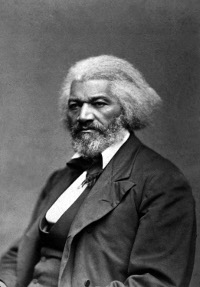Biographical essay

Frederick Douglass (born Frederick Augustus Washington Bailey; c. February 1818 – 20 February 1895) was an American social reformer, abolitionist, orator, writer and statesman. After escaping from slavery in Maryland, he became a national leader of the abolitionist movement in Massachusetts and New York, gaining note for his oratory and incisive antislavery writings. In his time, he was described by abolitionists as a living counter-example to slaveholders' arguments that slaves lacked the intellectual capacity to function as independent American citizens. Northerners at the time found it hard to believe that such a great orator had once been a slave.
Reference
Biographical essay
Died
Articles
Biographical profile published by The Daily Objectivist
Review of the book The Hemingses of Monticello: An American Family, by Annette Gordon-Reed
Videos
Presentation of the book of the same title, written by Timothy Sandefur and published by the Cato Institute, featuring the author as well as Juan Williams and Jonathan Blanks
The introductory paragraph uses material from the Wikipedia article "Frederick Douglass" as of 6 Aug 2018, which is released under the Creative Commons Attribution-Share-Alike License 3.0.
